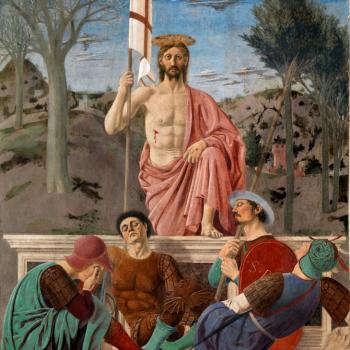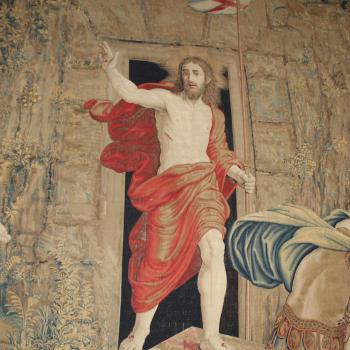Lectionary Reflections for Pentecost 8 – July 14, 2013
It has been said that the prophetic task involves agitating the comfortable and comforting the agitated. This is surely the case in today’s lectionary readings. Just ten days beyond the Fourth of July, these readings challenge our personal and national priorities and pretentions, and our temptation to subvert justice and care for the vulnerable for the sake of our economic and national well-being. The church, even the liberal church, is often too closely aligned with the powers that be. We may seek justice on the micro scale of personal relationships and preach justice from the pulpit and we may also implicitly benefit from unjust economic structures and practices that harm the most vulnerable members of our society. As Thomas Merton notes, we are all “guilty bystanders,” even when we are trying our best to balance the prophetic and the pastoral aspects of ministry.
Poor Amaziah! As a congregational pastor, I can appreciate his position. The work of the pastor often is at cross purposes with the work of the prophet. While this doesn’t take the pastor off the hook – after all, our calling is not only to minister to congregation and community but also care for those who are most vulnerable – the pastor’s task often involves reaching out to persons in our congregations for whom any attempt social transformation appears threatening to their incomes, portfolios, and lifestyles. The question is: how can we maintain the congregation’s institutional viability and our role – if not our job – as congregational spiritual leaders, while speaking truth to power.
Poor Amaziah! He is one of us, or, better yet, we face the same challenges that he did, ministering to king, or those whose largess maintains the church, while being faithful to God. His balancing act is threatened by Amos’ denunciation of the wealthy and powerful and call to radical social transformation. Amaziah may very well be sympathetic to Amos’ position. After all, he is an interpreter of the Torah and was well aware of the injunctions to practice justice and fairness, especially to the vulnerable. But, Amos, in his opinion, is going too far. Like the pastors Martin Luther King criticized in his “Letter from the Birmingham Jail,” Amaziah has to answer to both God and country, and king and Torah, and this leads to supporting the status quo rather than social change.
Amaziah may believe that he can achieve Amos’ goals by a gradualist approach that coaxes the leaders to seek justice. He believes that Amos is simply too radical in his questioning of authority: to follow Amos is to threaten the current social and economic underpinnings that are necessary for social order, Amaziah reasons. In contrast, Amos is urgent in his quest for social transformation – lives are at stake and although gradual change may improve things over the long haul, in the meantime, God’s beloved children are in pain and dying. Perhaps, Amos gave his own version of Martin Luther King’s “Why We Can’t Wait?” unsettling Amaziah who had to pastor to the ruling community.
Psalm 82 continues the message of social transformation. We forfeit our awareness of our divine nature when we fail to seek justice. Our ability to experience our holiness as God’s beloved children depends on our ability to see God’s presence in the most vulnerable members of society and, then, act on it. Just this morning, in response to one of my recent lectionary commentaries (Adventurous Lectionary, July 7, 2013), a good friend reminded me of the challenges many hotel workers face. She invited me to take a bolder social justice approach in my commentary. Perhaps, she was right in her counsel. Preaching the gospel is a whole person enterprise that engages head, heart, and hands, and this means justice-seeking.
The passage from Colossians is a precursor to the Orthodox vision of theosis, becoming as like unto God as possible. The apostle and his colleagues pray that the Colossians grow in fruitfulness and spiritual stature. Spiritual maturity involves living in resonance with God’s vision for our lives and communities. In drawing near to God, we draw near to others. Our spiritual growth involves the transformation of our worshipping communities and the larger transformation of our society.
Dorotheos of Gaza once described our relationship with God in terms of lines going from the circumference to the center of a circle. As we draw nearer to the center, that is, to God, we draw nearer to our neighbors. As we draw nearer to our neighbors, we come nearer to God. Love of God and neighbor can never be separated: we love the Creator by loving the creatures and in loving the creatures, we bring beauty to God’s experience of the world.
Jesus describes a holistic spirituality and then enacts it in the parable of the Good Samaritan. We are called to love God with our whole selves, body, mind, and spirit, and then love our neighbor with the same care that we love ourselves. We cannot separate love of God, self, and other in the dynamic movement of the spiritual life. We cannot fully love God if we turn our back on our neighbors or diminish ourselves. Our self-affirmation is dependent on our alignment with God’s vision for our lives and our embrace of our neighbor’s well-being as equal to our own. Jesus calls us to be great souled persons, “mahatmas,” who see God in all things and all persons and then work to bring forth the holiness of others and ourselves.
Self-love is essential to spiritual growth. The Jewish proverb proclaims: “If I am not for myself, who will be?” Love of others is equally essential to my spiritual growth and ability to love myself. As the proverb continues, “If I am only for myself, what am I?”
Jesus’ response to the Jewish teacher is a parable about an outsider who proves to be a true neighbor. A maligned Samaritan goes beyond his occupational needs and social boundaries to help an injured Jewish traveler, who in other circumstances might have scorned the Samaritan who risked greatly to save his life. Jesus challenges the racism of his people, the limitation of divine love to a particular faith and ethnic community, and images of morality that exclude persons’ goodness based on race and religion. Once again, the religious officials who passed the injured man were not evil people: they placed the abstract responsibilities of their positions ahead of the concrete needs of the person right in front of them. Their desire to get to Temple in a timely fashion and maintain their own ritual purity trumped their fidelity to God’s presence in a vulnerable countryman.
This passage is bound to leave pastors with a guilty conscience: How often have we passed by persons in need or deferred social involvement to keep the church going or to arrive at church on time? We are not bad persons either; we simply place our broad spectrum vocational callings ahead of the concreteness of God’s call in the present moment.
Our challenge is to grow in stature, so that we can creatively and lovingly balance our personal and institutional responsibilities, including our self-care and care for families and congregations, with the unsettling challenges to go beyond our immediate responsibilities so that we may become God’s partners in healing the world. Jewish mystics remind us that to save one soul is to save the world. From a God’s eye view, this means to care for our loved ones and ourselves as well as those who are loved by God and beyond the walls of our communities. This will lead to agitation but our agitation will find completeness and comfort in feelings of wholeness which emerge when we join our well-being with the well-being of our most vulnerable local and global companions.

















